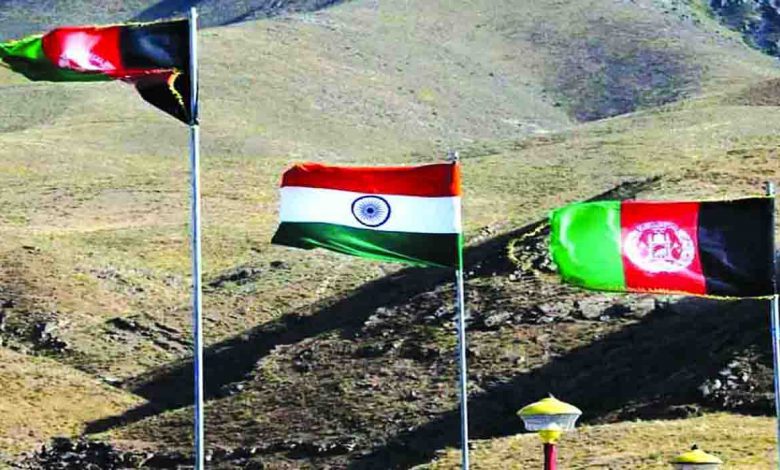Afghanistan – devastated by war, united by Indian entertainment industry

Monday, 20 September 2021 | Ashish Kaul | in Guest Column
GUEST COLUMN
 Ashish Kaul
Ashish Kaul
It was the Indian entertainment industry that had kept the flame of hope alive in Afghanistan. In every song and in every Indian artist they see peace and happiness. Amidst devastation, I saw gleaming hope in every Afghan eye and a smile on their faces. There was undoubtedly courage, valour and honour spread everywhere and in every soul. They look you in the eye and touch your heart with their simplicity and Shreen Choi (local version of Kehwa). It was during the trip, I felt this great desire to talk to them and I walked up to a dry fruit vendor. I started asking for prices and told him that his stuff was expensive. With a smile he explained in broken Urdu/Hindustani with a Dari ascent that it was a poor country. I asked him for how much was he willing to sell Kishmish and Pista to a “mehmaan’ in his country. He was quiet for a while and then asked me if I was Hindustani and I said yes. I was experienced multiple and overwhelming feelings of joy, pride and honour at the same time when he said “Hindustani mehmaan ke liye to sab muft me dega. I am confident that it was a reflection of what Afghans feel for India.
All those days I kept on experiencing their love and passion for India and the Indian entertainment. One of the journalists with a TV channel told me that he feels uneasy if he doesn’t watch Shahrukh’s Devdas three to four times a week and then there is this unparalleled pride they have for megastar Amitabh Bachchan who immortalised the Afghan Pathan as Badshah Khan in his magnum opus Khuda Gawah. They don’t refer to Amitabh Bachchan as an Indian but as one of their own and regale the stories of his stay in Afghanistan during the shooting of the film. India literally rules the hearts of Afghans and I was quite proud of the fact that we have conquered the world, this far, with our artists and love. Indian entertainment industry was present in every nook and corner of Kabul. Even Khalid (name changed) the driver of our car was a fan of Indian music and would always have Hindi films songs playing in the car. He even managed to sing quite a few of them amidst the tales he told us about Taliban and the horrid six months he had spent in their captivity. The torture marks on his body that narrated the story of his captivity were nothing less than battle glories for him. It is amazing to see how I could effortlessly converse and relate to all of them and that too in a land so far away and separated by a vindictive neighbour. Perhaps the answer lies in history, in the times when India and Afghanistan were neighbours. Anyone having seen the famous serial Mahabharat would know that the mother of Kauravas hailed from Kandahar. Sikhs too had woven themselves perfectly into the social system as a minority. From a distance, it is extremely difficult to tell one from an Afghan on the streets of Kabul. India means a dream to Afghans. The very mention of India lights up their eyes and immediately they all want to know of a city called ‘Bambai’. In one of the pressers the week after that was hosted by the then Information and Broadcasting minister of the Afghan government we expressed our desire to strengthen the presence of a certain cluster of channels, offer programmes in Pashto and Dari language and eventually be able to offer local programming through a dedicated channel for Afghanistan. Afghan officials lauded the role of India in development of Afghanistan and also shared with great affection the role Indian media and entertainment played in their land. I was also surprised when I was politely briefed in private to abstain from ‘praising’ Pakistani artists. For a change Pakistan was a hated word in an Islamic country. People of Afghanistan are much wiser today and two decades of war has taught them the difference between religion and terrorism against mankind of which they too are a part. Back then, though Afghanistan was limping back to normalcy, it was much mature in its worldly affairs as one can see even condoms being sold in the streets of Kabul, perhaps a rarity in an Islamic country and then there was, probably the largest ever money changing market on the roadside stretching to a mile. Afghans in torn clothes with heaps of currency notes changing and exchanging dollars and other upwardly mobile currency in a fear- free environment and without even a security person in sight. Something like this was unimaginable in India or anywhere else in the world. Another important surprise was to see numerous computer institutes painted all over the city reflecting the craze for learning English the American way. I also realised that Afghans can speak good English with a typical American accent. It comes naturally to them. I was very hopeful that Kabul could be to central Asia what India was to the world.
Then it was the gala that evening in Kabul where Jagjit Singh was to perform. We were escorted to Kabul Polytechnic’s famous auditorium which was made by Russians. It can accommodate about 2,500 people and by god, it had more than that and double the number of people waiting outside willing to pay anything to get inside. Each and every Ghazal sung by Jagjit Singh was popular and I was stunned to see a group of women take centre stage, singing along with him. The evening was rocking and so was I and largely because this was the Afghanistan that not many people would know of. A land that was part of my childhood memories and full of tales by my illustrious grandfather who managed a thriving Persian carpet manufacturing facility in Kandahar, Peshawar and Ranchi – all of that was lost to the excruciating partition and ensuing devastation of 1947. The penultimate day in Kabul also took me to the great Behzad cinema- a ghost from the past that used to premiere French cinema in the 50s through to the 70s.
The flight back to Mumbai next day was fun as usual, this time not because of the generosity of the crew but a technical failure in the AC of aircraft and we kept on pulling up the crew with our fast ones. Perhaps, I knew the answer why my friend Jitendra Bhargava had not acknowledged my previous SMS full of praise – he wouldn’t have believed it. However, in those few peaceful moments on the plane I was sure that I was proud to be a part of this great nation and have been here among the people who have lived in man-made hell for decades and yet not forgotten to smile. I also kept weighing how different would the geo-political situation be for the troika of India, Pakistan and Afghanistan had Rajiv Gandhi supported Gulbuddin Hekmatyar in forming the government in Kabul. He had assured Rajiv Gandhi that he would in turn ensure that no foreign /Afghan terrorist would venture into Kashmir. It was eventually the Afghan terrorists who unleashed the first terror wave in Kashmir in 1989 / 90. Having said that, it is in such great lands that one feels ashamed to abuse the freedom that we have in India. Personally, I have felt this way before when we lost the right to live peacefully back home in Kashmir and Kabul brought back all those memories and above all a reassurance of my personal belief – peace shall win one day. As for my friends in Kabul – I do say my prayers until I return to this great land soon enough.
(The writer is a media veteran and bestselling author. Views expressed are personal. Concludes)






